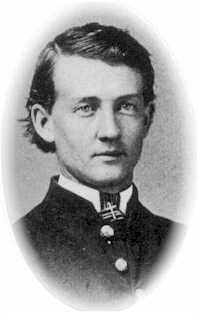 It’s Fall Break here in Colorado and I have greatly enjoyed my first day off in some time. Last night my son’s football team won the 8th grade city championship, 48-0. He is a starting defensive and offensive player on the team. After the win, his coach proclaimed them the best team he has ever coached. Hard for a father not to be extremely proud of his son. I was reflecting back on that today when I picked up to read, “A Soldier’s Story of the Siege of Vicksburg,” by Osborn H. I. Oldroyd (his initials spell OHIO) of the 20th Ohio. After the Battle of Champions Hill he wrote, “our army has never known defeat.” Grant might have reflected later that his Western men were the best he had ever commanded. If the Vicksburg Campaign were a football game, Grant’s Army of the Tennessee had won it quit easily, something like 48 to zero.
It’s Fall Break here in Colorado and I have greatly enjoyed my first day off in some time. Last night my son’s football team won the 8th grade city championship, 48-0. He is a starting defensive and offensive player on the team. After the win, his coach proclaimed them the best team he has ever coached. Hard for a father not to be extremely proud of his son. I was reflecting back on that today when I picked up to read, “A Soldier’s Story of the Siege of Vicksburg,” by Osborn H. I. Oldroyd (his initials spell OHIO) of the 20th Ohio. After the Battle of Champions Hill he wrote, “our army has never known defeat.” Grant might have reflected later that his Western men were the best he had ever commanded. If the Vicksburg Campaign were a football game, Grant’s Army of the Tennessee had won it quit easily, something like 48 to zero.
The 20th Ohio saw hard service in the West starting at Fort Donelson, Shiloh, Corinth and of course Grant’s Vicksburg Campaign. Regiment losses during service 2 Officers and 87 Enlisted men killed and mortally wounded and 4 Officers and 267 Enlisted men by disease. Total: 360.
Oldroyd’s book is based on his diary, not years-gone-bye romanticism where self-indulgence often convoluted old soldier’s recollections during the 1880s and 1890s. He takes up the narrative on May 1, 1863, after Grant landed his army on the east bank of the Mississippi River, and as his division (Logan) had crossed the Mississippi. The book covers sixty-five days of the Vicksburg Campaign ending in July 4, 1863, with the surrender of Vicksburg.
Logan’s division was at first toward the rear of the campaign and assigned to guard duty. This allowed for the men to spend some time foraging, of which he writes,
How foolish is it for the Southern people to flee and leave their beautiful property to the foe. We only want something to eat. There are some who would apply the torch to a deserted home, that would not due so if the owner remained.
Fear was everywhere as Southerners were convinced Lincoln’s hoards would burn, rape, and pillage. At first his regiment complained at the seemingly obtuse nature of their assignment. “But after we have captured Vicksburg,” Oldroyd writes, “We shall understand why we guarded Hankinson’s Ferry so long.”
But the 20th Ohio was not destined to remain in the rear with the gear. They would lead one of the assaults up Champion’s Hill. Their loyalty and love for one another carried them throughout the war. “A company of soldiers are as a family,” he noted.
They steadily made their way closer and closer to the front as Grant and Sherman entered Jackson. The evidence was clear. They passed the dead, mostly Confederates. One desperate Rebel laid in a garden, clearly dying. He was suffering and Oldroyd gave him a drink from his canteen. He spoke of compassion.
Soon they were in battle, Oldroyd’s bunkmate was shot down, a bullet “through the brain.”
But still on they pressed, “on to Vicksburg” they cried. Comrades continued to fall all around them. He describes the gruesome fate of one,
Thomas Runyan, of Company A, was wounded was wounded by a musket ball which entered the right eye, and passed behind the left forcing it out upon his cheek. As the regiment passed, I saw him lying by the side of the road, tearing the ground [with his fingers] in his death struggle.
They had yet to reach Champion Hill, and the bloody battle that awaited them.